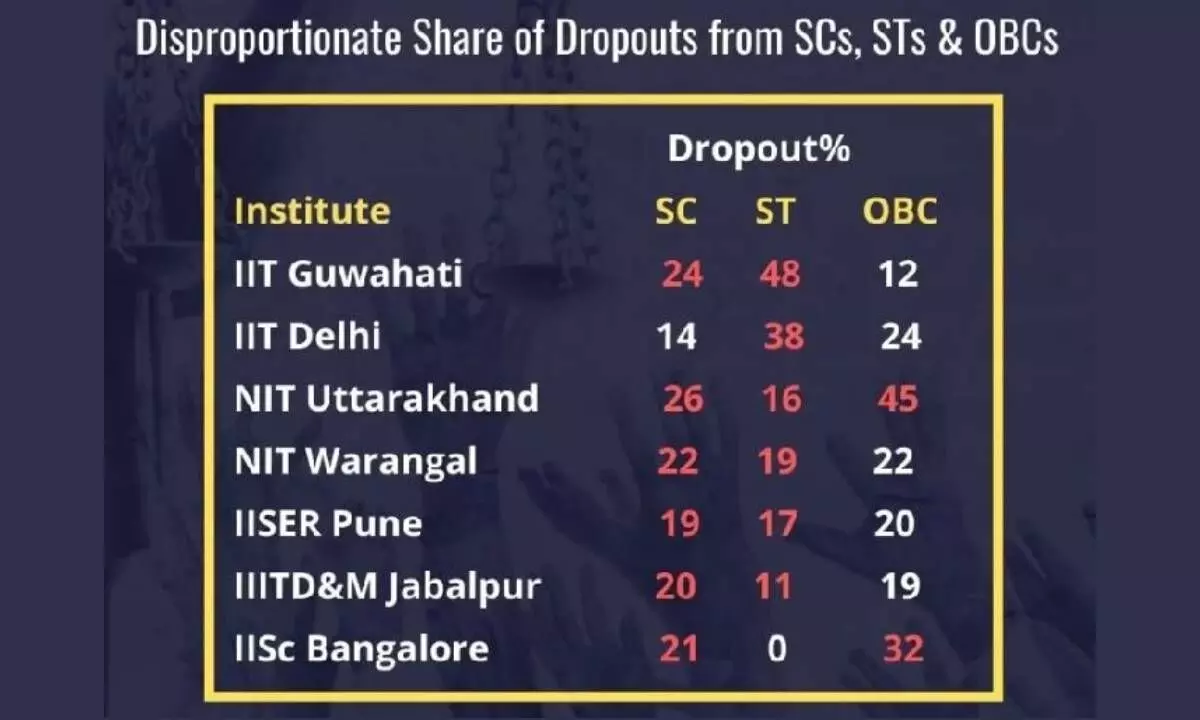Bridge gaps in education ecosystem key for a thriving inclusive economy
Educational deprivation can fuel social unrest and political instability
image for illustrative purpose

Being the world’s fifth largest economy and bidding to be the third biggest economic powerhouse, India needs to further accelerate the pace and expand the scope of quality and affordable education for all. Though a Uniform Education Code (UEC) in terms of quality, accessibility and affordability appears to be a distant dream given the yawning socio-economic and political gaps between haves and the have-nots, efforts must be made to ensure that at least those that have stepped into the campuses of higher education institutions (HEIs) braving all odds and hardships don’t drop out, as sought by President Droupadi Murmu at a recent Visitor’s Award function.
Expressing concern over the magnitude of the problem of drop-outs in IITs and IIMs, she said that as institutional leaders, central institutions of higher learning have a major responsibility in transforming India into a knowledge superpower.
Referring to an analysis done by the Central government in 2019, on the basis of data of two years, she said that around 2500 IIT students left their studies midway and about half of them came from the reserved classes. She sought an early solution to the problem of drop-outs and suicides by students.
For most of the youth, higher education is the most effective way to emerge from adverse situations. Providing equitable and inclusive higher education to youth coming from socially and economically disadvantaged groups is one of the priorities of the new National Education Policy (NEP-2020) and make India a global knowledge super-power. She said that the country’s knowledge centres should become hubs of the knowledge economy.
The higher drop-out rate among reserved category students, mostly from SC, ST and OBC communities, is largely because of their poor schooling. For want of resources, they cannot avail themselves of coaching classes. The concept of tutorial classes, which used to be extremely helpful for poor students, has been junked now. Unlike children from the well-off sections, those from weaker sections depend on what they are taught in the government schools and whatever little bit their parents can spend in the name of providing private tuition to them. The results are alarming. Over 19,000 students belonging to OBC, SC, and ST categories dropped out from various courses at central universities, IITs, and IIMs during 2018 to 2023. Sharing the information in the Rajya Sabha, Union Minister of State for Education Subhas Sarkar stated that of the total dropouts, 14,446 were from central universities, 4,444 from IITs, and 366 from IIMs.
A report prepared by the Students’ Federation of India (SFI) claimed that the number of dropouts from 2016 to 2020 in IITs, NITs, IISERs among other Centrally Funded Technical Institutions (CFTIs) belonging to the reserved communities was over 60 per cent.
"Around 63 per cent of the undergraduate dropouts at the top seven IITs belong to the reserved category, of which almost 40 per cent are from the SC and ST communities. SC and ST groups together formed 50 per cent, 40 per cent and 30 per cent of the dropouts at NIT Uttarakhand, Warangal and Calicut. Similar trends were observed at IISc, IISERs and IIITs," said the report.
According to some data, at least 683 SC seats, 831 ST seats and 591 OBC seats were not filled in CFTIs from 2016 to 2020.
A wholesome approach needs to be adopted to check the dropout rate from weaker sections and not just focusing on an increase in the gross enrolment (GER) ratio but to build a new and really inclusive India by 2047.
By fostering a highly educated workforce, countries can enhance productivity, innovation, and technological advancements, thus attracting foreign investments and boost domestic entrepreneurship.
Moreover, educated citizens are more likely to be employed in higher-paying jobs, leading to increased personal income and consumer spending, which, in turn, stimulate economic growth. Furthermore, education empowers individuals to make informed decisions, promoting financial literacy and responsible investments, contributing to overall economic stability.
Therefore, investing in education is not only an investment in human capital but also a pathway to sustainable economic development and prosperity for nations across the world. As the world’s most populous country, India can no longer be complacent with less than 29 per cent gross enrolment ratio in which the share of those who account for the country’s 80 per cent population, is quite insignificant.
Let us admit that educational deprivation among the masses will have far-reaching and detrimental consequences for individuals, communities, and societies as a whole. Lack of access to education perpetuates a cycle of poverty. Without education, individuals are often limited to low-paying jobs and limited social mobility, widening the gap between the rich and the poor. Similarly, when large sections of the population are deprived of education, potential innovators and problem solvers are also lost. This hinders overall societal development and the ability to address pressing challenges effectively.
Moreover, educational deprivation can fuel social unrest and political instability as marginalized individuals may feel excluded from the benefits and decision-making processes within society.
Last but not the least, on a macroeconomic level, educational deprivation disturbs a country’s economic growth and development. A poorly educated workforce may struggle to meet the demands of a rapidly changing global economy, leading to a less competitive nation on the international stage. No doubt, providing equitable access to quality education, especially to marginalized and disadvantaged populations, is crucial for fostering inclusive and sustainable development.
(The writer is a senior journalist, columnist and author. The views expressed are strictly his personal)

